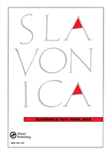
SLAVONICA
metrics 2024
Advancing Scholarship in Slavic Studies
Introduction
SLAVONICA is a distinguished academic journal dedicated to the exploration and analysis of Slavic studies, incorporating a wide array of cultural, historical, and linguistic perspectives. Published by Routledge Journals, Taylor & Francis Ltd, this journal serves as a critical platform for interdisciplinary scholarship, emphasizing the dynamic nature of Slavic cultures and languages. Though it currently does not offer Open Access, SLAVONICA is an important resource for researchers, professionals, and students seeking to engage with the latest academic discourse in the fields of Cultural Studies, History, Literature, and Linguistics, achieving a recognized place in the Q4 quartile across several categories as of 2023. With coverage spanning from 1994 to 2024, and its commitment to fostering academic inquiry, SLAVONICA plays a vital role in elevating the understanding of Slavic heritage and contemporary issues, making it essential reading for anyone interested in the complexities of this region.
Metrics 2024
 0.10
0.10 -
- 0.20
0.20 3
3Metrics History
Rank 2024
Scopus
JCI (Web Of Science)
Quartile History
Similar Journals

Journal of Lusophone Studies
Celebrating the Vibrancy of Lusophone LiteraturesJournal of Lusophone Studies, published by the American Portuguese Studies Association, is an esteemed, open-access journal dedicated to the exploration and analysis of Lusophone cultures, languages, and literatures. Since its inception in 2016, this journal has made significant strides in advancing scholarship within its field, providing a vital platform for researchers, professionals, and students. The journal covers a broad array of topics, focusing on history, linguistics, literature, and the visual and performing arts, making it an invaluable resource for interdisciplinary studies. Although it currently holds a Q4 ranking in multiple categories, its commitment to promoting awareness and discourse in Lusophone studies emphasizes its growing importance. The Journal of Lusophone Studies not only enriches academic dialogue but also fosters scholarly connections across the globe, enhancing the understanding of a diverse cultural heritage that spans continents.

Zbornik Matice Srpske za Slavistiku-Matica Srpska Journal of Slavic Studies
Exploring the Depths of Slavic HeritageZbornik Matice Srpske za Slavistiku - Matica Srpska Journal of Slavic Studies, published by Matica Srpska in Serbia, is a prominent academic journal focusing on the diverse and rich field of Slavic studies. With an ISSN of 0352-5007 and a commitment to advancing knowledge in linguistics, literature, and cultural contexts, this journal serves as a vital resource for researchers, professionals, and students alike. Although designated as an open access journal, its significance is highlighted by its ranking in the lower quartiles of 2023 across various categories, including Q4 in Linguistics and Language and Q3 in Literature and Literary Theory. The journal's Scopus rankings further reflect its position, with a percentile of just 8th for Language and Linguistics. These factors underscore the journal's ongoing contribution to Slavic scholarship from 2019 to 2024, fostering dialogue and exploration in a field that remains crucial for understanding Eastern European cultures and languages.

Lingua Montenegrina
Unveiling the Rich Tapestry of Montenegrin Linguistics and CultureLingua Montenegrina is a distinguished academic journal dedicated to exploring and advancing the fields of Montenegrin language and literature. Published by the Institute of Montenegrin Language and Literature, this journal serves as a vital platform for researchers, educators, and students interested in the nuances and development of Montenegrin linguistics, literature, and cultural studies. With an ISSN of 1800-7007, it contributes significantly to the scholarly discourse in the region and beyond. While the journal operates under a traditional subscription model, it ensures that its readership has access to high-quality research that is pivotal for understanding Montenegrin identity and cultural expressions. The commitment of Lingua Montenegrina to rigorous academic standards and its focus on regional studies positions it as an essential resource for those looking to deepen their understanding of the Montenegrin language and its literary heritage.

Palaeobulgarica-Starobalgaristika
Advancing Understanding of Bulgaria's Historical LegacyPalaeobulgarica-Starobalgaristika is a distinguished academic journal published by the Bulgarian Academy of Sciences, focusing on the rich history and cultural heritage of Bulgaria and the surrounding regions. With an ISSN of 0204-4021 and an E-ISSN of 2603-2899, this journal serves as an essential platform for researchers, historians, and scholars, providing a forum for the dissemination of innovative research and interdisciplinary studies. The journal has established its significance in the field by achieving an impressive Q3 ranking in History and boasting a Scopus rank of #702 out of 1760 in the Arts and Humanities category, placing it in the 60th percentile. Operating within the timeline of 2019 to 2024, it strives to explore various facets of Bulgarian history, cultural identity, and archaeological findings. While currently not an open-access journal, Palaeobulgarica-Starobalgaristika remains committed to enhancing the academic conversation within its field, making it an invaluable resource for those dedicated to understanding and preserving Bulgaria's historical narrative.
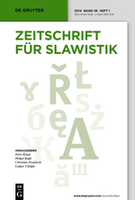
ZEITSCHRIFT FUR SLAWISTIK
Unveiling the Rich Tapestry of Slavic Linguistics and LiteratureZEITSCHRIFT FUR SLAWISTIK, published by WALTER DE GRUYTER GMBH, is a renowned journal focusing on Slavic studies, encompassing various fields such as cultural studies, linguistics, and literary theory. With its ISSN 0044-3506, this distinguished journal has been a significant contribution to the academic community since its inception in 1956, continuing to disseminate valuable research until 2024. While maintaining a strong reputation within several academic categories, ZEITSCHRIFT FUR SLAWISTIK holds a Q3 ranking in Cultural Studies and Linguistics and Language, and a Q2 ranking in Literature and Literary Theory as of 2023. This positioning underscores the journal’s impact, particularly as it caters to an audience of researchers, professionals, and students invested in the rich tapestry of Slavic culture and language. Access to this journal is not open; however, its comprehensive articles are crucial for anyone aiming to explore and deepen their understanding of Slavic linguistic and literary traditions. The journal's work is essential in fostering cross-disciplinary dialogue and advancing scholarship in these vital areas.

Studi Slavistici
Connecting Scholars Through Open Access ResearchStudi Slavistici is an esteemed academic journal published by FIRENZE UNIV PRESS, focusing on the rich and diverse fields of Cultural Studies, Linguistics and Language, and Literature and Literary Theory. Since its initiation in 2004, it operates under an Open Access model, providing unrestricted access to its contents and fostering a wider dissemination of research. Based in Italy, this journal serves as a vital platform for scholars and researchers engaged in Slavic studies and beyond, encouraging interdisciplinary dialogue and innovative approaches. With its current Quartile rankings in the Q4 category across various domains, it plays a significant role in shaping dialogues within the academic community while offering insights into contemporary and historical perspectives. By maintaining an inclusive vision and engaging with critical issues, Studi Slavistici remains dedicated to advancing knowledge and scholarship in these intricate fields.

Mundo Eslavo-Journal of Slavic Studies
Exploring the Depths of Slavic HeritageMundo Eslavo - Journal of Slavic Studies is a prominent journal published by UNIV GRANADA, EDITORIAL, dedicated to advancing the field of Slavic studies through open access scholarship since 2004. With an ISSN of 1579-8372 and an E-ISSN of 2255-517X, the journal aims to provide a platform for interdisciplinary research, covering a wide array of topics including literature, culture, history, and linguistics of Slavic regions. Based in Granada, Spain, this journal is crucial for researchers, professionals, and students seeking to explore and contribute to the understanding of Slavic heritage and contemporary issues. With a commitment to accessibility and scholarly rigor, Mundo Eslavo invites submissions that push the boundaries of conventional discourse in Slavic studies, ensuring that critical insights and diverse perspectives reach a global audience.
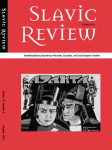
SLAVIC REVIEW
Exploring the Depths of Slavic Culture and History.SLAVIC REVIEW, published by Cambridge University Press, is a prominent academic journal that delves into the rich tapestry of Slavic studies, focusing on the cultural, historical, and social dimensions of Slavic regions. With an ISSN of 0037-6779 and an E-ISSN of 2325-7784, this journal holds a significant position within the academic community, ranking in the Q2 category of Arts and Humanities (miscellaneous) and achieving a Q1 rating in Cultural Studies as of 2023. Notably, the journal has consistent relevance in the field, as evidenced by its Scopus rankings—Rank #260 in Cultural Studies and Rank #204 in Miscellaneous Arts and Humanities. Since its converged years starting from 1966 up to the present, SLAVIC REVIEW has been an essential resource for researchers, professionals, and students aiming to deepen their understanding of Slavic cultures. While it operates on a traditional subscription model and does not provide open access, the journal remains a vital platform for pioneering research and critical discourse in Slavic studies.
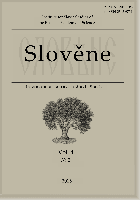
Slovene-International Journal of Slavic Studies
Advancing Interdisciplinary Insights in Slavic StudiesThe Slovene-International Journal of Slavic Studies, published by the Russian Academy of Sciences, Institute of Slavic Studies, serves as a vital platform for scholarly discourse in the fields of Cultural Studies, History, Linguistics, and Religious Studies. Since its transition to Open Access in 2012, the journal has enriched academic dialogue, enabling wider circulation and accessibility of research findings. Based in the Russian Federation, the journal supports interdisciplinary approaches, inviting contributions that push the boundaries of traditional Slavic studies. With a commendable ranking in the Q3 quartile across multiple categories as of 2023 and respectable Scopus rankings, it stands out as a crucial resource for researchers and students alike, enhancing their understanding of Slavic and related cultural contexts. The journal's commitment to fostering international collaboration and dialogue positions it as an invaluable asset for anyone engaged in the complexities of Slavic studies.
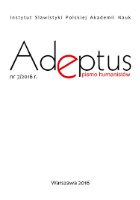
Adeptus
Fostering Innovative Scholarship in Slavic StudiesAdeptus is a pioneering open-access journal published by the Polish Academy of Sciences, Institute of Slavic Studies, specializing in Slavic studies and cultural research. Since its inception in 2014, the journal has aimed to foster scholarly dialogue and advance knowledge across various disciplines related to Slavic languages, literature, history, and sociology. With an ISSN of 2300-0783, Adeptus has positioned itself as a vital resource for researchers, professionals, and students engaged in Slavic studies, offering a platform for high-quality, peer-reviewed articles that explore diverse topics within the field. The journal's open-access model promotes accessibility and dissemination of knowledge, making it a significant contributor to the academic landscape. Located in Warsaw, Poland, Adeptus continues to thrive as a key outlet for innovative research, inviting submissions that embody rigorous scholarship and insightful perspectives.